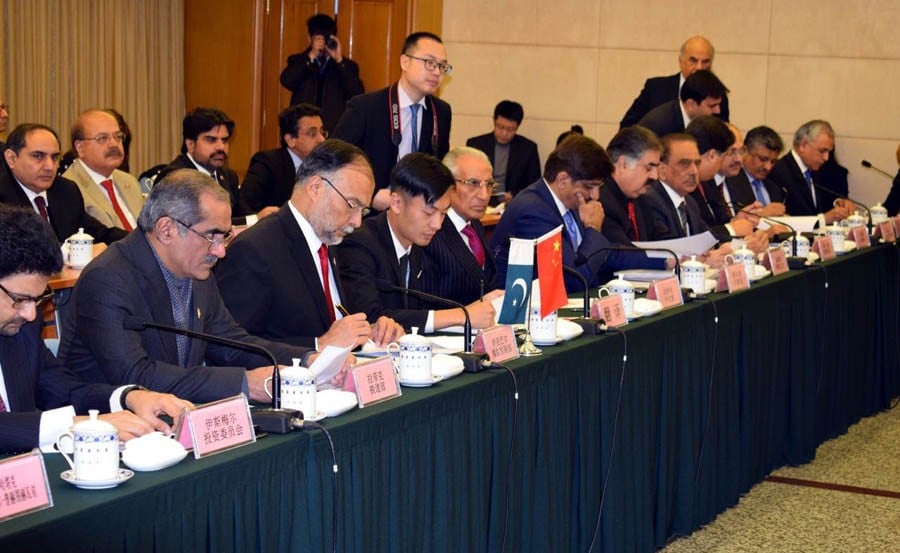
Balochistan missed out on the opportunity of having a special economic zone in the 7th Joint Cooperation Committee of CPEC as it failed to produce a feasibility report in time

A two-day meeting of the 7th Joint Cooperation Committee (JCC) of the China-Pakistan Economic Corridor (CPEC) concluded in Islamabad on November 21. An important decision made at the JCC, which completely escaped media scrutiny, perhaps due to the Faizabad dharna, was that three special economic zones (SEZs) would be set up in the country, one each in Punjab, Sindh and Khyber Pakhtunkhwa (KP).
A special economic zone for Balochistan could not be approved -- because the Balochistan government failed to prepare feasibility on time.
The precise details of SEZs under CPEC are not known. Normally, a SEZ is a dedicated site for businesses to set up production units. These businesses are provided incentives in the form of tax holidays, uninterrupted power supply, better support infrastructure, security, and better logistical connections.
Among other things, SEZs help in creating job opportunities -- which Balochistan needs more than any other province.
Balochistan is undergoing a low-level insurgency since the last 12 years. One of the reasons for the insurgency is economic deprivation. This isn’t just political rhetoric but an economic reality, shared in reports published by the federal government. According to Report on Multidimensional Poverty 2016, published by Federal Ministry of Planning and Development and UNDP, Balochistan has the highest multidimensional poverty score at 71.8 per cent, second highest in the country after Fata.
The three approved SEZs are Rashakai Free Economic Zone in Nowshera district (KP), Faisalabad Free Economic Zone (Punjab) and Dhabiji Economic Zone in Thatta district (Sindh). Bostan, situated at a distance of 50km in the North-West of Quetta, was proposed to be the fourth SEZ to be approved. All federating units, including Gilgit-Baltistan and Fata, reportedly submitted feasibility studies of SEZ on time, except Balochistan. Now, Bostan can’t be made SEZ of CPEC at least till the next JCC meeting scheduled at the end of 2018..
Balochistan is the most impoverished province of Pakistan and needs SEZs more than other provinces. So, why did its government fail to produce feasibility reports on time?
The answer lies in lack of interest and prioritisation by the government.
In order to deal with the issue of SEZs, Balochistan announced the establishment of an SEZ authority in 2013. Its first task was to appoint a full-time CEO. The government advertised a vacancy twice, first in October 2013 and second in January 2014. People with relevant qualification applied for the position that never heard back from the government.
Presently, the SEZ authority is running on ad-hoc basis without a full-time CEO. Secretary Industries Department holds the additional charge of CEO of this authority. First and the only reported board meeting of the SEZ authority took place in January this year with chief minister Balochistan in the chair. It was decided in the meeting to appoint a consultant to prepare feasibility within six weeks.
"The government started the process of hiring a consulting firm very late, and then delayed issuing the contract as it had to be vetted by the law department," says a well-placed source in the government of Balochistan on condition of anonymity. He adds that the value of the contract was Rs5 million and "it could have been approved by the CEO. There was no binding to send it to the law department".
When TNS contacted the Planning Commission officials in Islamabad they said that preparing feasibility reports is the duty of the provincial government and they are supposed to hire experts for this purpose. Federal government can only provide the technical expertise in preparation of feasibility reports only when provinces make an official request.
Jan Achakzai, Special Assistant on Media to CM Balochistan, denied that the government of Balochistan failed to submit feasibility report for SEZ. "Nine feasibility studies were presented by all [provincial] governments including one by the Balochistan government. They have been referred to the working group. Now the Chinese government will make an appraisal of viability of these reports after consulting with various stakeholders," Achakzai tells TNS.
He argues that three SEZs of Faisalabad, Rashakai and Dhabiji got an immediate go ahead because they were more or less fully functional, unlike Bostan SEZ which requires more work.
Apparently, Achakzai was referring to the nine proposed SEZs of CPEC Special Economic Zones (SEZs) mentioned on CPEC.gov.pk, the official website for CPEC in Pakistan. There are nine SEZs that have been approved after the initial pre-feasibility reports but the provincial governments have to submit detailed feasibilities to be approved as a part of the CPEC, something which the government of Balochistan failed to do in 7th JCC.
Now the government of Balochistan has a year before the next JCC. Before that the government of Balochistan must make the SEZ authority functional and hire a professional CEO with technical expertise. Once, the SEZ authority is established, it must take measures to prepare feasibility reports not only for Bostan but also for other potential SEZ sites.
The highest number of complaints for being left out of CPEC comes from Balochistan. Still, the Balochistan government fails to prioritise the CPEC matters. The case of Bostan SEZ in the 7th JCC is just one example.
The provincial government must take the technical issues of CPEC seriously for Balochistan to benefit from the CPEC and all of its projects.